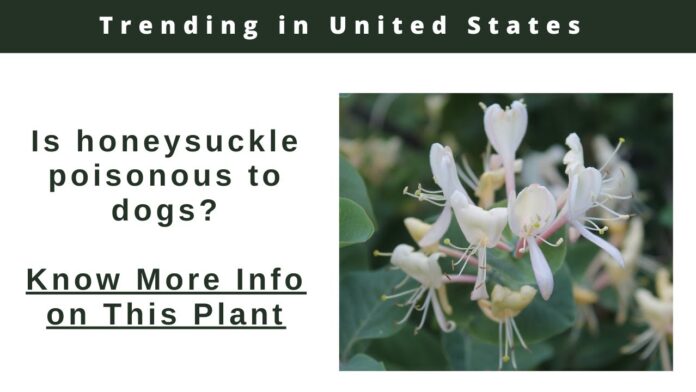If you’re wondering “is honeysuckle poisonous to dogs” the quick answer is that most honeysuckle varieties are generally safe for dogs but some species can cause mild discomfort if consumed in large quantities. As a responsible pet owner, it’s crucial to understand the potential risks and know which varieties to watch out for.
Understanding Honeysuckle and Its Effects on Dogs
Honeysuckle, scientifically known as Lonicera, is a common ornamental plant found in many gardens. While exploring more about dog safety and plants, you might want to check out our comprehensive guide about dog-safe plants and flowers. At Pet like boss, we’re committed to helping you make informed decisions about your furry friend’s safety.
Different Types of Honeysuckle and Their Safety Levels
-
Japanese Honeysuckle (Lonicera japonica)
- Generally safe for dogs
- Most commonly found variety
- Can cause mild stomach upset if eaten in large amounts
-
Tartarian Honeysuckle (Lonicera tatarica)
- Berries can be mildly toxic
- May cause gastrointestinal issues
- Should be monitored around pets
Signs Your Dog Has Eaten Too Much Honeysuckle
Even though honeysuckle isn’t typically dangerous, watch for these symptoms – Mild vomiting- Diarrhea- Lethargy- Excessive drooling- Temporary stomach discomfort
Prevention and Safety Tips
-
Garden Management
- Keep plants trimmed and maintained
- Remove fallen berries promptly
- Consider fencing off honeysuckle areas
-
Training Your Dog
- Teach “leave it” commands
- Supervise outdoor time
- Provide alternative entertainment
-
Safe Alternatives
- Plant dog-safe flowers instead
- Create designated pet play areas
- Use pet barriers when needed
What to Do If Your Dog Eats Honeysuckle
-
Immediate Actions
- Assess how much was consumed
- Remove remaining plant material
- Monitor your pet’s behavior
-
When to Contact a Vet
- If large quantities were eaten
- If your dog shows unusual symptoms
- When in doubt, always call
Creating a Pet-Safe Garden
-
Planning Your Space
- Research safe plants
- Create separate areas for plants and pets
- Use natural barriers
-
Safe Plant Options
- Rose
- Sunflower
- Marigold
- Petunias
-
Maintenance Tips
- Regular pruning
- Proper waste disposal
- Routine garden checks
Common Misconceptions About Honeysuckle and Dogs
Many pet owners worry about honeysuckle toxicity, but it’s important to understand that not all concerns are warranted. Let’s bust some myths:
-
All Honeysuckle is Toxic
- False: Most varieties are safe
- Moderation is key
- Individual reactions may vary
-
Natural Means Safe
- Not always true
- Some natural plants are toxic
- Always research first
Tips for Dog-Proofing Your Garden
-
Physical Barriers
- Use fencing
- Create designated paths
- Install raised beds
-
Natural Deterrents
- Safe repellent plants
- Motion-activated sprinklers
- Pet-friendly mulch
-
Regular Maintenance
- Remove dead plants
- Keep areas clean
- Monitor for hazards
Educational Resources and Support
-
Professional Help
- Consult veterinarians
- Work with landscapers
- Join pet owner groups
-
Online Resources
- Plant databases
- Pet safety websites
- Garden planning tools
While the question “is honeysuckle poisonous to dogs” might cause concern, most honeysuckle varieties pose minimal risk to our canine friends. However, it’s always better to err on the side of caution and monitor your pet’s interaction with any plants in your garden.
Remember to:- Research plant varieties before adding them to your garden- Monitor your dog’s outdoor activities- Keep emergency vet contacts handy- Create a safe environment for your pet
By following these guidelines and staying informed, you can maintain a beautiful garden while keeping your furry friend safe and happy. For more detailed information about pet safety and plant toxicity, continue exploring our resources at Pet like boss.
Final Thoughts
Creating a pet-safe environment doesn’t mean you have to sacrifice having beautiful plants like honeysuckle in your garden. With proper planning, monitoring, and awareness, you can enjoy both your garden and your four-legged friend without worry. Stay informed, stay vigilant, and most importantly, enjoy the journey of pet parenthood!
Remember, when in doubt about any plant’s safety, always consult with your veterinarian or a pet poison helpline. Your dog’s safety is worth the extra effort and research!












